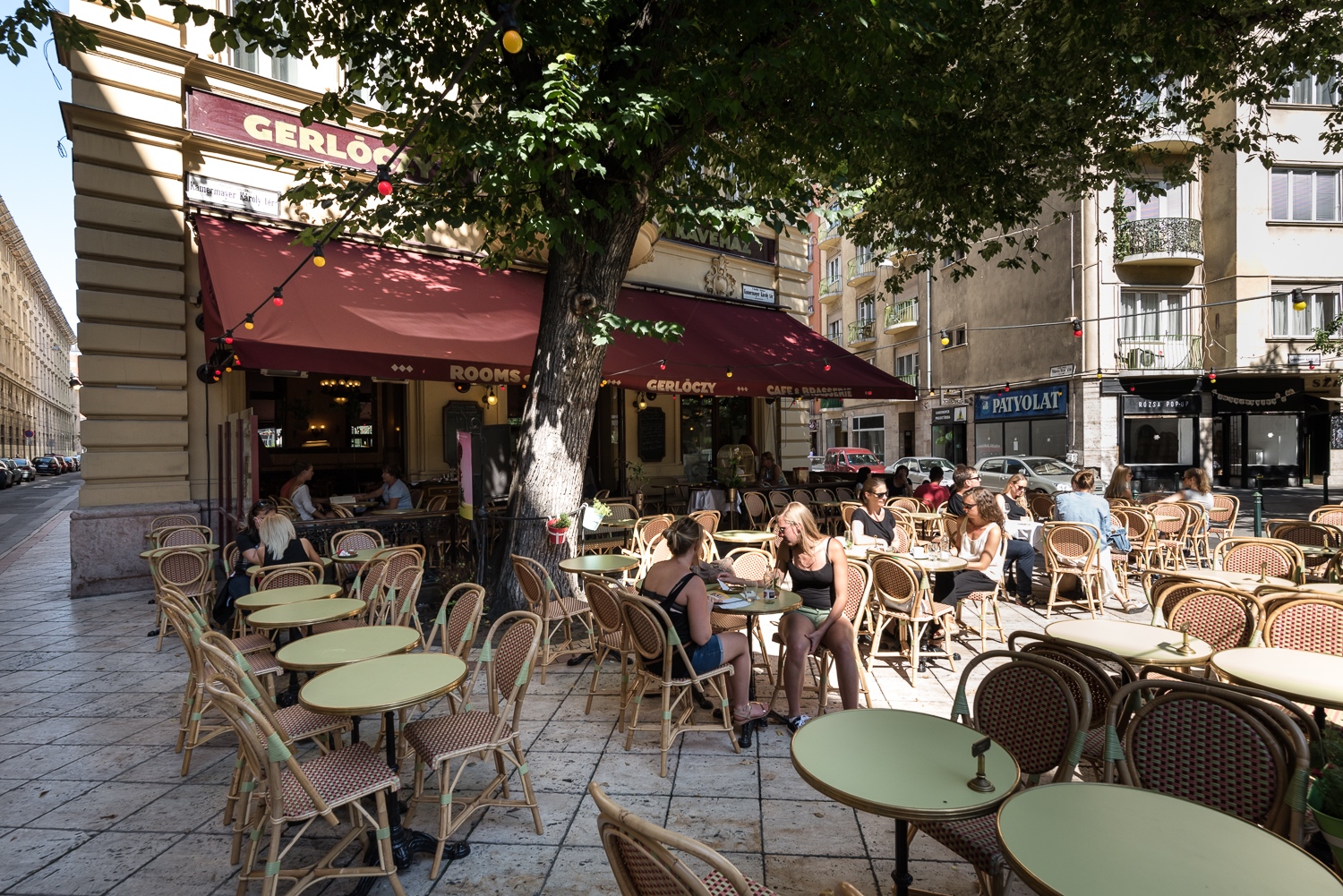Shaded by a towering elm, this restaurant and its sprawling sidewalk seating-area may seem from a bygone era, but in reality the Gerlóczy Café is one of Budapest’s newer classically styled coffeehouses, only opening in 2004 (although its building dates back to the 1890s). However, the interior and exterior design was meticulously crafted to resemble an old-world French bistro, achieving such success that when Steven Spielberg filmed Munich in Budapest during 2005, this terrace served as the location for a Paris-based scene. Since then, the Gerlóczy Café’s star quality continually makes this a popular downtown oasis for breakfast, lunch, and dinner; expanding on that success, management took over the entire building in 2007 to create a boutique hotel of 19 rooms, all bearing the same charming je ne sais quoi of the restaurant downstairs – and so we were eager to travel through time with a one-night stay at the Gerlóczy Rooms deLux.The Gerlóczy Café’s alfresco tables are perennially tempting (a heated section of the terrace remains open throughout winter), but today we pass right by them to find the entrance to Gerlóczy Rooms deLux through the wooden doorway beside the restaurant, flanked by curvaceous wrought-iron lamps mounted on a sculpted arch. The lobby is little more than a hallway with a polished front desk and a chalkboard beside it suggesting the café’s special offers – and this is fitting, because the Gerlóczy Rooms deLux facilities are not meant to be an urban resort where guests spend hours on end; there are no amenities like a spa or business center – this is a city hotel designed as a stylish base for travelers exploring the surrounding metropolis. Regardless, soon after checking in we discover one of the inn’s most impressive features – its golden-gleaming spiral staircase.Gerlóczy Rooms deLux has an elevator, but somehow the stairs always seem a more appealing option – winding upward five stories to the attic rooms with exposed wooden beams, these steps are illuminated by a round stained-glass skylight that makes the curving gold-painted walls shimmer with reflected rays. While climbing from one floor to the next we admire how each story’s wainscoting-lined hallway is painted with different colors, from golf-course green to a subdued deep blue to blood red. Intermittently leaning over the metal banister to look up or down along the way, we perversely enjoy the swirly sensation of mild vertigo that this stairway can provide.We reach the third floor and our room, and opening the tall black door we immediately appreciate the classic interior – velvet chairs and flowing drapes present a soft visual counterpart to the arrow-patterned parquet floor and striped wallpaper. An antique armoire is also painted gold to match the brass chandelier, and inside the bathroom every fixture is also an antique or a realistic reproduction, including the metal washbasin and claw-foot bathtub. If it weren’t for the trendy kokedama plant on the table and the flat-screen TV mounted on the wall, it would be easy to imagine this as the setting of a romantic passage in a Hemingway novel.With our bags unpacked, we bound back down the spiral stairs for a quick cappuccino in the café, stepping into the restaurant interior through a discreet doorway from the stairwell. Our time-transcending sensation continues here, as the bistro really does appear like a scene from a century ago – the booths are upholstered with black leather and adorned with brass coatracks topped by angel figurines, the marble-topped kitchen counter is lined with baskets of fresh-baked bread, and patrons can peruse assorted daily newspapers hung in wooden clamps, appearing like proud flags of old-fashioned intellectualism.
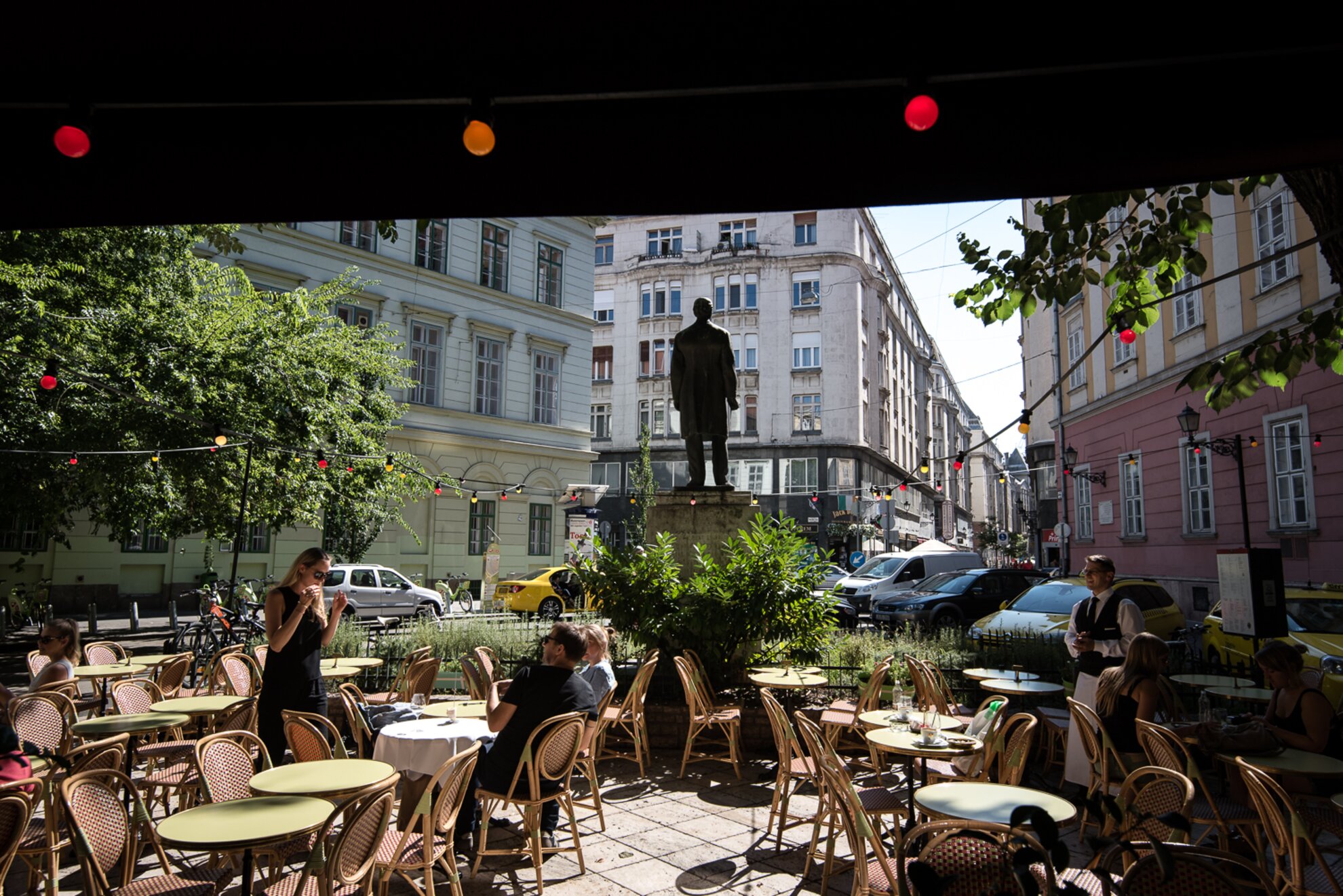
Endearing as the café interior is, our arrival coincides with a splendidly sunny afternoon, so we walk out to the awning-covered terrace and enjoy the fin-de-siècle milieu so often captured in tourists’ digital cameras. We are encouraged to pick any available table, and select one next to Jacquette the resident canary – who seems quite all right with living encaged amid these pleasant surroundings – before eavesdropping on fellow patrons speaking Spanish, German, English – and even some Hungarian.
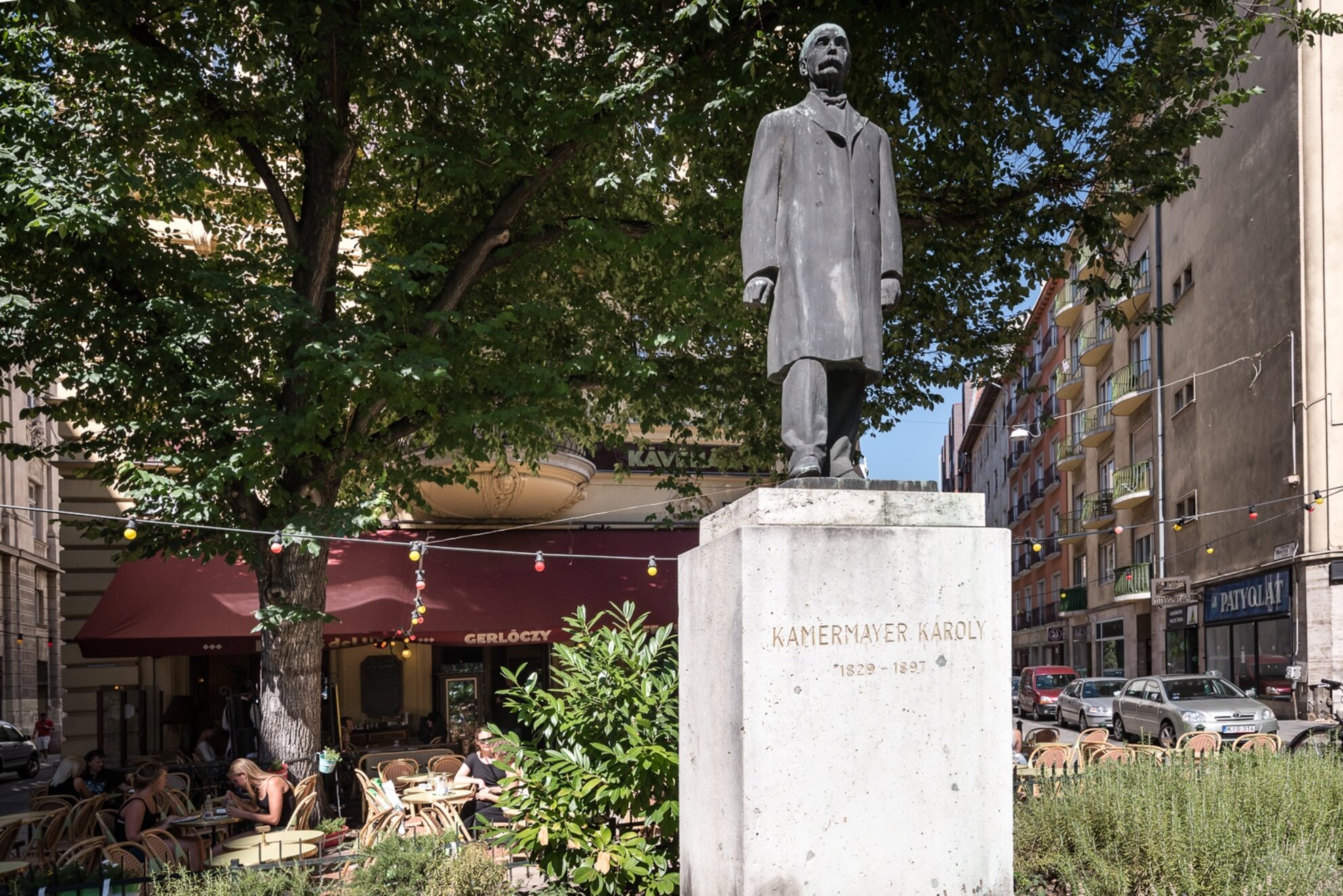
While slurping spoonfuls of brown-sugar-sprinkled frothy milk, we admire the statue of Károly Kamermayer (the first mayor of unified Budapest, after the once-separate cities of Buda, Pest, and Óbuda all reached across the Danube to join forces in 1873), eternally standing tall above the tranquil Gerlóczy terrace. Meanwhile, we also check out the restaurant’s more modern design elements – the creative team here presents amusing signs that innovatively portray ingredients of some signature dishes, such as the one near our table promoting the crispy salmon with carrot puree and lemon mayonnaise: in the photo, each item necessary to cook this dish is stacked atop the other like a totem pole, with the egg for the mayo balanced precariously toward the top.

We finish our coffee and head out for a walk to enjoy downtown’s charm – from the Gerlóczy’s central location, it’s equally easy to saunter toward the shops of Váci Street or the ruin pubs of District VII, and with the city’s prime transport hub of Deák Square just a five-minute stroll away, the rest of Budapest is reachable from here with minimal effort. But unlike most Gerlóczy visitors whose itinerary revolves around sightseeing, we spend the evening taking care of mundane matters before heading back to the hotel with plans to check our work e-mails by using the free WiFi in our room… but upon returning to the Gerlóczy terrace, we find ourselves suddenly awestruck by what seems like a time-bending scene out of Midnight in Paris.
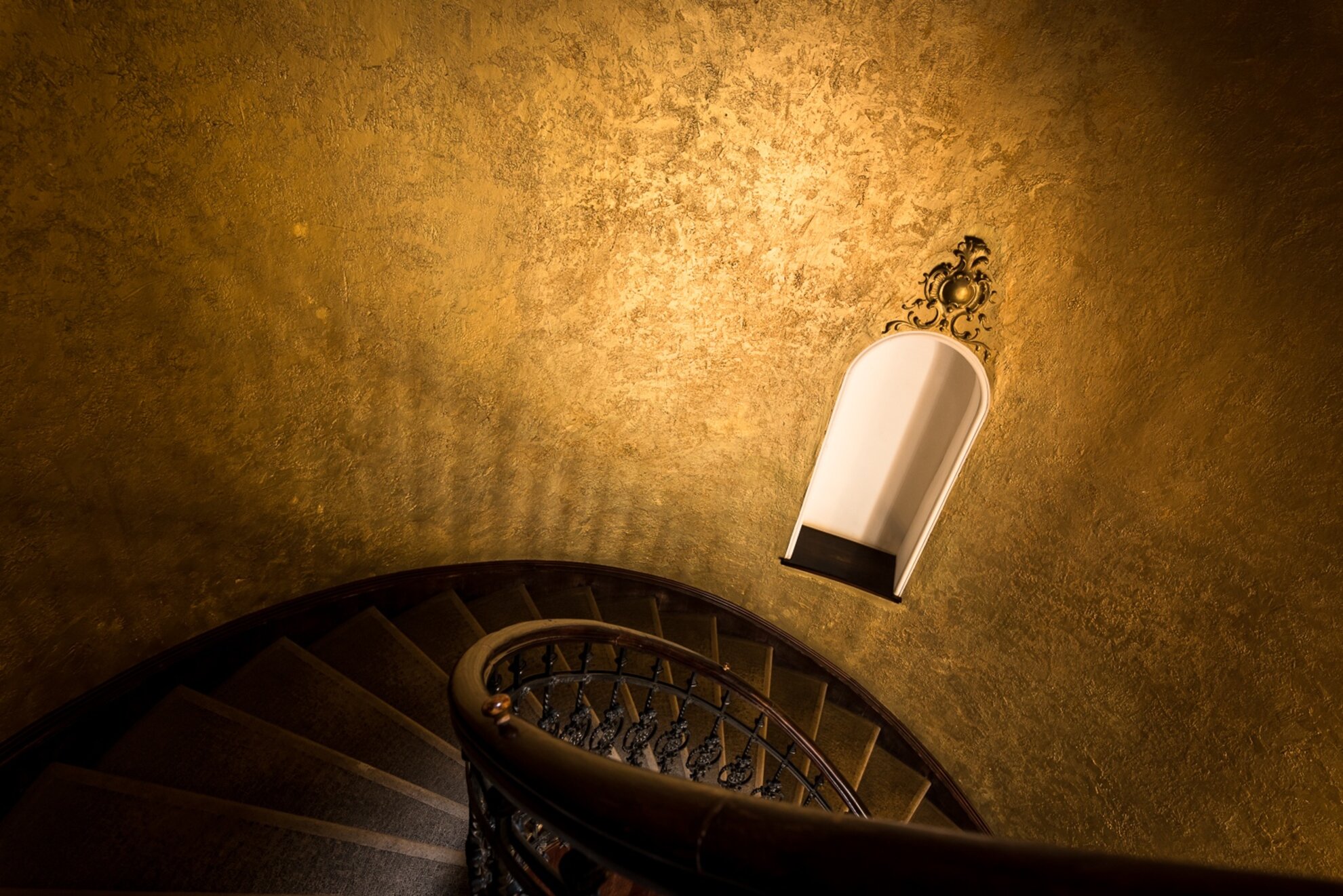
Beneath illuminated multicolored bulbs strung above the sidewalk tables, a gentlemanly harpist is out on the terrace playing “Those Were The Days”. Diners complement the music with clinking knives, forks, and glasses, their intermingled multilingual conversations buzzing across the square and the dark night air. At an empty table we envision Scott and Zelda Fitzgerald exchanging witty drunken banter, and such chatter floats skyward along with the harp’s vibrations to burst into our room as we open the window, before we take a look down to the terrace through the elm’s shimmering leaves to complete the cinematic scene. (Actually, the evening’s fantasy was truly fulfilled as we greedily availed ourselves to the free minibar, stocked with tasty cheesy scones and ginger-infused cookies baked onsite, a Valrhona chocolate bar, and bottles of beer and sparkling wine.) Besotted as a black-and-white movie star, we drift into dreamland on the comfortable bed.
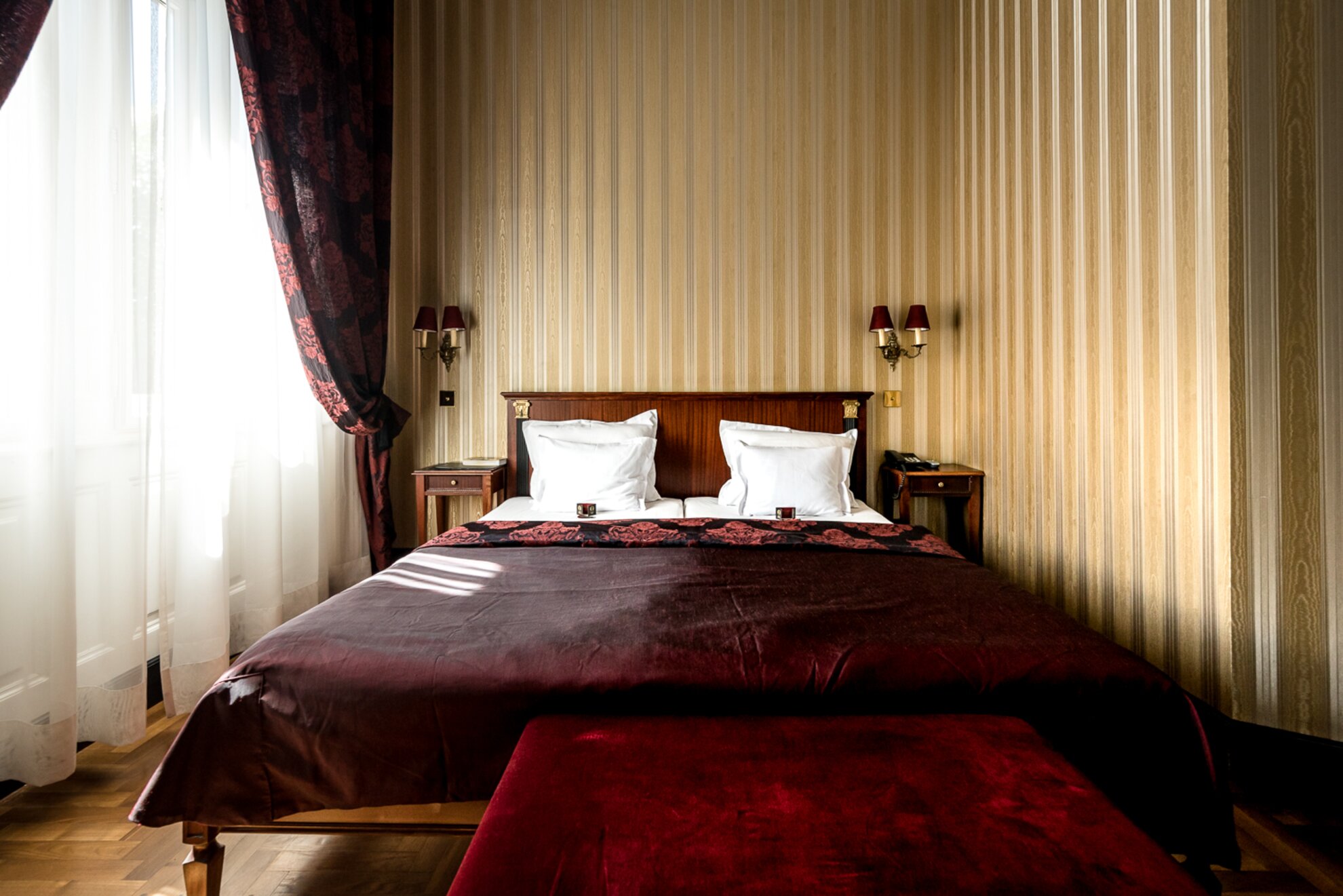
Indirect sunlight awakens us, and after minimal washing up we stagger back downstairs into the café for breakfast. When staying at the Gerlóczy Rooms deLux with the morning-meal option included, guests enjoy a unique feature – instead of a set breakfast offer, patrons can order anything from the menu with a 12-euro limit, and so we indulge in flaky fresh-baked croissants and scrambled eggs with ham, mushrooms, and cheese, again savoring our old-world European environment and letting the sleepiness linger. But when the bill is brought for our signature, we notice that a fancy bottle of Badoit sparkling water was added to the total; pointing out that we never ordered this (and that it brought our total over the limit), we are immediately presented with an apology as the check is quickly corrected.

There was no harm done, aside from the incident snapping us back into reality – which was probably for the best, as it was time to check out and leave this silver-screen setting behind to return to our ordinary lives in Budapest. Still, thanks to the Gerlóczy, now we know how extraordinary it must’ve been to live the good life in old-fashioned times – here style and small details still matter, and we appreciated the novel experience.
As of press time, room rates at the Gerlóczy Rooms deLux range from 85 euros per night to 110 euros per night, breakfast not included; see the hotel’s official website for current rates and discounts.
We Love Budapest’s “Guest Experience” series profiles various Budapest hotels that invite our staff to visit at no charge, but with the understanding that we may include negative impressions in our coverage; hotel management is not allowed to review these articles before they are posted.
